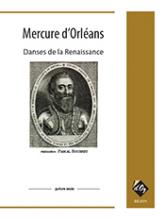
Danses de la Renaissance
Acheter: Productions d'Oz DZ 2171
Pièces pour le luth de Mercure d'Orléans arrangées pour guitare par Pascal Bournet.
Ballet 18, 20, 21, 23, Ballet du Roy, Branles simple, Branle nouveau, Courante 5, 6, Volte 12, 13, 14, Gaillarda.
Classical Guitar Magazine
"I love Renaissance instrumental music, particularly on the lute and I have great respect for Pascal Bournet whose many works I have seen and heard before and am a committed admirer of. Therefore I was delighted to see some pieces by a composer whose name I had not come across before, apparently a nom de plume for Philippe-Emmanuel de Lorraine, also a name I had never come across before. There are 13 pieces presented here, obviously from a much wider selection, judging by their titles. According to the Preface the pieces, it appeared were lute originals. Fine but what first strikes the prospective player is their entire lack of fingering or any other guitaristic help whatsoever. I took that, at first glance, to mean that any intervention of that sort would, on playing the pieces, be deemed to be unnecessary, then I hit on a dilemma, for there are several places where some of the stretches are awkward and laboured. Some I managed to find a way around, because as in the first piece Ballet 18, written in D I discovered it was much easier with a lute-like 3rd string to F#, likewise the next piece Ballet 20. But that was not always the case, as in the next piece Ballet 21, written here in E minor, in which the F# proved to be no help at all. So, had the key been changed from the lute original? It would have been nice to know that, because nearly all lute originals benefit from a 3rd string to F#, yet there were some here that didn't benefit at all. As for the music itself it was, as Renaissance styles go, a little unusual with a number of places where you found yourself wondering where it was going, musically speaking but nevertheless still involving enough to want to try playing, and tuning and fingering would have been helpful in quite a few places. [...]"
Chris Dumigan